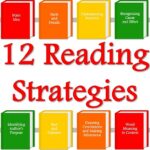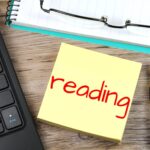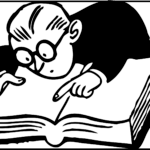10 Tips for Becoming a Better Reader If You’ve Fallen Behind
Many students who’ve fallen behind think becoming a better reader is an impossibility. That couldn’t be further from the truth. No matter where you’re starting from, it’s possible to improve your reading skills.
In the following article, we’ll be discussing why you should care about becoming a better reader. We’ll also touch on the difference between reading for pleasure and reading for education and why both are absolutely necessary to reading smarter, not harder.
Now, without further ado, let’s open to page one and start reading. Turn the page!
Reading for Enjoyment vs. Reading for Learning
Some students will proudly tell you they “hate reading.” Then, when no one’s looking, or perhaps when someone is looking but the student just isn’t thinking about it, they’ll have a favorite magazine or comic book open.
The truth is, no one really hates to read. They just hate being compelled to read the things that don’t come naturally for them. The good news if you’re one of these people is this: reading for enjoyment is vital to improving your overall reading skills.
That’s because it allows you to exercise those reading muscles, expand your vocabulary, and learn better ways of expressing yourself. It also helps to get you ahead professionally because you can port over those skills to your studies and future profession.
So, the first step to becoming a better reader is to find what you enjoy reading and dive into it with both eyes (or, in the age of audio books, ears). Soak it up and before you know it, it’ll be easier to jump into other subject areas and grow as a student, a professional, and a person.
Now that we’ve explained the necessity of reading for enjoyment, let’s talk about ways to read smarter, not harder. Next page!
Reading Smarter, Not Harder
What do we mean by reading smarter and not harder? And what do we mean by one over the other? Basically, this.
When you read hard, you make the reading more difficult and challenging than it ought to be. We’ll be discussing some ways to avoid this when we get into the 10 tips we promised you below. Likewise, when you read smarter, you tap into the enjoyment and excitement you feel when you just can’t put down that magazine or book. Here’s how to do it.
1. Look at What You Are About to Read
The first thing to do to read smarter and to improve your overall speed and comprehension is to look ahead. Some call the process “pre-reading” because you’re not reading but you’re definitely preparing to read.
An example: say you have to read a chapter in your biology book and you’re really not looking forward to it. Been there, done that.
Instead of starting from word one and treating each word with the same expectations of boredom, do a little helpful procrastination. Count the number of sections in the chapter. Then, count the number of pages in each section. Then, the number of paragraphs.
Once you’ve got your numbers recorded in your brain, start at the top and read one at a time, noting what you’ve accomplished along the way. This exercise will create mental momentum to help you get through the most difficult of material.
2. Do a Time Estimate
We’ll be the first to acknowledge that not every written piece is going to be as accessible as a summer reading blockbuster. That’s okay. If you have to move a little slower with the material to understand it, just factor that into the pre-reading.
The key is to figure out how long it should take you to barrel through the information, with retention factored in. Then, compare it to the amount of time you have to read it before the deadline.
Set up your milestones for each day and try to eat the casserole a little bit at a time instead of all at once. You might even find your reading for retention time improves as you delve further into the material. In fact, you almost certainly will because your understanding will improve along the way!
3. Pay Close Attention to Subheaders
The 21st Century Reader doesn’t have a lot of time for dense walls of text and information. Most authors today understand how to use white space (more on that in a moment) when they’re creating a novel or short story or textbook.
So, to write for a 21st Century Audience, most authors will break up their materials into sections with subheadings that describe what each section is going to be about. As you’re doing your pre-reading, pay particularly close attention to what these subheadings say.
They give you a clear road map for what the rest of the material will cover. If you get lost along the way, you can see how the subheadings flow together to get you back on track.
4. Scan the Text
It may seem like you’re doing a lot of work right now without doing any actual reading. But that’s only because we’re spending time to describe what we mean with each tip. In reality, you can blast through many of these tips in a few seconds or less as you prepare to engage with the material you’ll be reading.
The next thing we want you to do before reading is to scan the text. Make note of any bold-faced or italicized or underlined words. Examine the bullet points or numbered lists if the page has them on there.
Get a feel for how the author uses white space and language. Do they incorporate a lot of big words and long sentences, short words and short sentences, or a combination of the two? Do this before committing to a line-by-line reading of the information, and it will keep you from getting stumped along the way. (Or keep you from getting stumped as much as you would be otherwise.)
5. Focus on Main Words
In everything you read, you’ll encounter descriptive words, main idea words, and connector words. Descriptive words and main idea words are very important to the overall meaning of the text. Connector words are important because they keep the language flowing coherently, but they don’t have to be given as much weight as the rest.
You’ve probably already figured out that connector words are things like “a,” “an,” or “the,” and prepositions. They’re not unimportant but you don’t have to spend a lot of time with them when you’re reading through the material. Allow your brain to “see” them without slowing down. Save your questions and attempts at understanding for the rest.
6. Hone on Difficult or Challenging Concepts
As you read, some information and language will come naturally to you. Let it. Keep the mantra in play that you don’t have to read every single word. But when you hit a roadblock, let that be a signal to switch the gears of your brain to a different type of reading.
When that happens, slow down and make sure you take in every word that you see, even the ones you might consider insignificant. In these cases, how the language is used is what’s the most important thing to understand. And once you do understand it, it’ll be a lot easier to read more challenging concepts without having to slow down as much.
7. Explore Connections
What makes a good reader a great reader? For us, it’s the connections they’re able to make to the material they’re reading. Connections come in three primary forms:
Text-to-text: what other written material does the material you’re reading remind you of?
Text-to-self: what about your own life does the material remind you of?
Text-to-world: what world events — current or past — does what you’re reading speak to?
The more of these you can make, the better you’ll be able to understand what you’re reading. And as you jump into the process of making connections, it’ll go much faster.
A good exercise for honing your connectivity skills is to pause at the end of each chapter and jot down anything outside of the material that the material actually reminded you of. Then, label that connection text-to-text, text-to-self, and text-to-world. Yes, it’s okay if an item allows you to make multiple types of connections.
8. Plan Ahead
You have to learn to give yourself enough time. This is especially true in the academic world where you’re engaging with difficult or challenging concepts. You cannot read a textbook the same way you would Stephen King. So, take a long-range overview before you begin a new project, semester, or unit.
Give yourself enough time to understand the challenge of the material you’re about to read. Also, coordinate it with the amount of time you actually have to read it. Then, work a little each day at a realistic pace to get to where you need to be.
9. Embrace the Joy of Reading
It’s very important to understand that, while reading is a requirement in school, it also needs to be somewhat enjoyable. The only way to do that is to read what you enjoy and tear down the stigma of it in your own mind.
And as you embrace the joy of reading, realize that you’re not going to like everything you read. But if you can port over the same reading comprehension skills that you use for accessible material, it will allow you to tap into whatever you need to tap into to understand the more difficult material.
In other words, the joy of reading can get you through some pretty unenjoyable things. And you should let it.
10. Share About What You Have Read
You’ve probably noticed that this list dwells a lot on what to do before you read and while you’re reading. But what about after?
This time actually is the most important. That’s because it allows you to engage with the material without the safety net of having the text in front of you.
It forces you to look inside yourself and see what you retained while you were reading. The bad news: you’re not going to remember everything. The good news: what you do remember will make that material more accessible than it was before, and it will prepare you to reengage with the material the next time that you have to study it.
Write out what you remember after you read. Share your insights with classmates or anyone interested who will listen. Only by extrapolating your insights can you allow your brain to synthesize and internalize that information.
What Has Helped You the Most in Becoming a Better Reader?
The tips we’ve shared here will most definitely help you in becoming a better reader. But now it’s your turn. What are some tips and tricks that you’ve used to improve your reading skills? Share in the comments section below!
[Featured Image by Edutopia]








